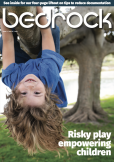
The OECD’s recent findings that “the disciplinary climate in schools in Australia was among the least favourable in the OECD” should ring alarm bells and resonates with the anecdotal experiences of IEU members reported to the union.
Sadly, the report notes “around 37 per cent of Australian lower secondary school principals reported that intimidation or bullying among students occurs at least weekly”.
Overwhelmingly, teachers manage challenging behaviours. However, sustained poor student behaviour is an area that deserves closer scrutiny. The impact on a teacher of unpredictable student outbursts and threatening and violent behaviour cannot be underestimated. These scenarios require greater support, a clear set of responses and good record keeping.
The former NSW Government appointed Professor Donna Cross to be the first Chief Behaviour Advisor. The position covers government, Catholic and independent schools. While it is useful to shed further light on cyber bullying, student re-engagement and school refusal, the impact of sustained challenging behaviours towards teachers must also be addressed.
The recent UK teachers’ union NASUWT annual conference in Glasgow dealt with teacher and in turn union responses to sustained anti-social student conduct which was violent, threatening and clearly detrimental to the learning process. Industrial stoppages (read strike action) took place when extreme situations were not responded to appropriately. It was felt COVID impacted negatively on student behaviour. Missed school, shared classes, classes in the hall, yard and the like contributed to the problem.
The union focus is to achieve responses by systems of schools and independent schools which are evidence based but support teachers. Professor Cross is to work across the three sectors but unless data is compiled across all NSW schools, the appropriate responses to the various critical incidents will vary enormously.
When a school goes into ‘lockdown’ and the police are called and a critical incident declared, the union expects a series of predictable steps to be taken to ensure a ‘safe workplace”. The IEU intends to seek a meeting with Professor Cross to ensure that teacher welfare is to the fore of her deliberations and to advance the unions’ view that a common reporting framework for critical incidents is the way forward. Incident reporting is currently not straightforward in our sector. A critical incident should not have to be solely managed at school level. Teachers should be confident their workplace is safe.
The union has Challenging Student Behaviour clauses in most Catholic Dioceses Work Practices Agreements. These clauses are useful but should not be the last resort. Teachers must feel supported, safe and confident that serious matters are managed appropriately.
The union also intends to seek a meeting with Catholic Church Insurance to consider a protocol to be followed when a critical situation emerges.
It is worthy to note that of all the PD provided by the union, the most popular in recent times has been about managing challenging behaviours (see page 9). The IEU frequently has more than 250 members online, fine tuning their responses to challenging behaviours.
Low level disruptive behaviours (talking out of turn, moving around the room) can be managed. Disengaged behaviours (late to class, truancy, and non-completion of set work) can be managed with a supportive whole school approach.
The challenge is aggressive and anti- social behaviours (verbal abuse, sexual harassment, physical abuse or acts of violence). The third category is challenging for all, but particularly for early career teachers. Teacher attrition rates reflect unmanaged situations where school or system policies do not fully capture the experience of the classroom practitioner but rather focus on the student. Students must be provided viable alternatives, but teachers must be supported professionally. Return to work support post a critical incident must be negotiated, not imposed.
The IEU believes that a uniform reporting system of critical incidents (and responses) is required. Publicly available information of such processes should be constrained to avoid ‘league tables’ being developed.
The purpose should be to support the teaching profession. Such protocols should not divide the profession but rather enhance it. The involvement of teacher unions is critical.
It’s imperative that teachers and school leaders are supported and protected in terms of their psychosocial and physical safety.









































































































































